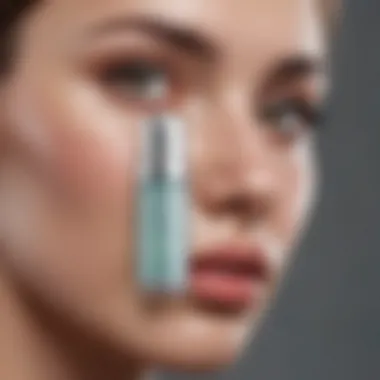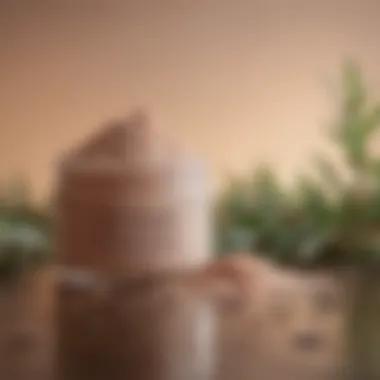Unveiling the Ultimate Exfoliant Guide for Rosacea Skin Care


Beauty Tips and Tricks
When it comes to dealing with rosacea-prone skin, incorporating the right exfoliant into your skincare routine can make a significant difference in managing flare-ups and maintaining skin health. One essential tip is to opt for exfoliants that are gentle and non-abrasive, such as those containing lactic acid or PHAs (polyhydroxy acids). These ingredients help to exfoliate the skin without causing irritation or inflammation.
Tip: Always perform a patch test before fully integrating a new exfoliant into your regimen to ensure compatibility with your sensitive skin.
Skincare Routine Tips
Incorporating an exfoliant into your skincare routine for rosacea requires a gentle approach to avoid triggering sensitivity. Begin by cleansing your face with a mild, non-irritating cleanser before applying the exfoliant. Remember to follow up with a soothing moisturizer to lock in hydration and protect the skin barrier.
- Start by exfoliating once a week and adjust frequency based on skin tolerance.
- Consider incorporating a physical exfoliant (using soft brushes or cloths) for a milder approach.
Haircare Hacks
While focusing on skincare for rosacea, it's crucial not to overlook haircare products that may come in contact with your face. Opt for sulfate-free shampoos and conditioners to minimize irritation. Additionally, tying back hair during skincare routines can prevent products from coming into contact with the face and exacerbating rosacea.
- Look for hair products with minimal fragrance to avoid potential skin reactions.
- Consider air-drying your hair instead of using heat styling tools to reduce heat-related flare-ups.
Makeup Application Techniques
When applying makeup to rosacea-prone skin, choose products formulated for sensitive skin and free of common irritants. A primer can help create a smooth base, while green-tinted color correctors can counteract redness. Lightly dabbing products onto the skin instead of rubbing can prevent aggravating delicate areas.
- Use a foundation brush or sponge for a more controlled and gentle application.
- Opt for mineral makeup with fewer synthetic ingredients to reduce the risk of irritation.
Understanding Rosacea and Its Impact on Skin
This section serves as the cornerstone of our comprehensive guide, shedding light on the complexities of rosacea and its profound effects on the skin. It is crucial to grasp the nuances of rosacea to navigate the skincare terrain effectively. By understanding rosacea's impact on the skin, individuals can tailor their skincare routines to address specific needs and challenges.
What is Rosacea?
Rosacea, a chronic skin condition, manifests in various forms, each with distinct characteristics and symptoms. By exploring the types of rosacea, individuals can identify their specific subtype and customize their skincare approach accordingly. Understanding the multifaceted nature of rosacea empowers individuals to make informed decisions regarding exfoliation methods and product selection.
Types of Rosacea
Among the several types of rosacea, each type presents unique challenges and considerations. Distinguishing between these types is essential for targeted skincare regimens. By delving into the nuances of each type, individuals can choose appropriate exfoliants that cater to their specific concerns and skin sensitivities.


- Understanding the four main types of rosacea (Erythematotelangiectatic, Papulopustular, Phymatous, and Ocular) provides insights into the diverse manifestations of the condition.
- Identifying the predominant symptoms and triggers associated with each rosacea type allows for customized skincare regimes that mitigate flare-ups and promote skin health.
Common Symptoms
Exploring the common symptoms of rosacea offers a deeper understanding of the condition's effects on the skin. By recognizing these symptoms, individuals can proactively address flare-ups and sensitivities through appropriate skincare practices.
- Common symptoms such as facial redness, visible blood vessels, acne-like breakouts, and eye irritation are prevalent among individuals with rosacea.
- Understanding these symptoms is pivotal in selecting gentle exfoliants that soothe irritation and inflammation without exacerbating existing skin concerns.
Challenges of Exfoliating Rosacea-Prone Skin
Navigating the realm of exfoliation for rosacea-prone skin presents unique challenges that demand a delicate balance between efficacy and sensitivity. By acknowledging these challenges, individuals can adopt tailored approaches to exfoliation that promote skin health and radiance.
Sensitivity Issues
Sensitive skin is a common trait among individuals with rosacea, necessitating cautious selection of exfoliants to avoid adverse reactions. Addressing sensitivity issues empowers individuals to choose exfoliation methods that gently resurface the skin without causing discomfort or inflammation.
- The hallmark of sensitivity in rosacea-prone skin lies in heightened reactivity to external stimuli, necessitating the use of mild exfoliants that nurture rather than irritate the skin.
- By prioritizing gentle formulations and soothing ingredients, individuals can exfoliate effectively while preserving the skin barrier and minimizing redness and flare-ups.
Avoiding Aggravation
Efforts to avoid exacerbating rosacea symptoms during exfoliation are paramount in maintaining skin health. By implementing strategies to prevent aggravation, individuals can enjoy the benefits of exfoliation without compromising the skin's delicate balance.
- Strategies such as patch testing new exfoliants, opting for fragrance-free options, and adhering to recommended usage frequencies are instrumental in minimizing skin irritation.
- By steering clear of harsh irritants and embracing a mindful approach to exfoliation, individuals can cultivate a skincare routine that nurtures their skin's resilience and vitality.
Key Considerations for Choosing the Right Exfoliant
In the intricate realm of skincare, the significance of selecting the right exfoliant for rosacea-prone skin cannot be overstated. Ensuring the gentle yet effective removal of dead skin is crucial for individuals dealing with the sensitive nature of rosacea. This article delves into the essential factors to consider when navigating the array of exfoliants available in the market, providing a compass for those seeking optimal skincare solutions.
Gentle Formulations
Chemical vs. Physical Exfoliants
When deliberating between chemical and physical exfoliants, one must weigh their distinct characteristics against the backdrop of rosacea-prone skin. Chemical exfoliants, such as alpha hydroxy acids and beta hydroxy acids, delve deep into the skin to dissolve impurities gently. On the other hand, physical exfoliants utilize granules or particles to manually buff away dead skin cells. Balancing the exfoliating prowess with the sensitivity of rosacea-prone skin is a delicate act, necessitating a thorough understanding of one's skin needs.
Ingredients to Look For
The landscape of skincare ingredients can be overwhelming, especially when targeting rosacea-prone skin. Among the plethora of options, key ingredients stand out for their efficacy in exfoliation without causing irritation. Salicylic acid, known for its anti-inflammatory properties, is a stellar choice for those combating both acne and rosacea. Additionally, lactic acid offers gentle exfoliation while hydrating the skin, a boon for those with rosacea's accompanying dryness. By prioritizing non-abrasive and soothing ingredients, one can embark on a fruitful skincare journey tailored to the specific needs of rosacea.


Avoiding Harsh Irritants
Common Irritants to Avoid
In the quest for the right exfoliant, steering clear of common irritants is paramount for maintaining skin harmony. Alcohol, a pervasive ingredient in many skincare products, can be detrimental to sensitive skin types like rosacea. Artificial fragrances, often lurking in exfoliants, pose a significant risk of triggering adverse reactions in rosacea-prone individuals. By mindful selection and meticulous ingredient scrutiny, one can shield their skin from unnecessary distress.
Fragrance-Free Options
Fragrance-free exfoliants emerge as beacons of hope for those navigating the treacherous waters of rosacea skincare. Free from potentially sensitizing compounds, fragrance-free options offer a safe haven for delicate skin in need of gentle exfoliation. Embracing fragrance-free alternatives not only minimizes the risk of irritation but also heralds a more serene skincare regimen, devoid of unnecessary complexities.
Recommended Exfoliants for Rosacea-Prone Skin
In the intricate domain of skincare for individuals grappling with rosacea, selecting the ideal exfoliant emerges as a pivotal step. Recommended Exfoliants for Rosacea-Prone Skin play a crucial role in this narrative, offering a path towards skin restoration and equilibrium. Delving into this realm unveils a spectrum of possibilities aimed at addressing the complex needs of sensitive skin.
Top Chemical Exfoliants
Salicylic Acid
Salicylic Acid, an essential component in skincare formulations for rosacea, uniquely contributes to the skin's overall health and appearance. With its notable anti-inflammatory properties, Salicylic Acid delicately penetrates the skin, relinquishing impurities and promoting a revitalized complexion. Its ability to exfoliate gently makes it a preferred choice in combating rosacea's manifestations. While commendable for its efficacy in unclogging pores, individuals must navigate its potential drying effects cautiously.
Glycolic Acid
Glycolic Acid, another stalwart in the realm of chemical exfoliants, lends a helping hand in the pursuit of optimal skin health for rosacea-prone individuals. Renowned for its exfoliating prowess, Glycolic Acid aids in shedding dead skin cells, unveiling a radiant visage beneath. Its capacity to boost cell turnover offers a rejuvenating touch to sensitive skin. However, akin to Salicylic Acid, users need to be mindful of potential skin sensitivity that could arise.
Best Physical Exfoliants
Jojoba Beads
Among the array of physical exfoliants catering to rosacea, Jojoba Beads emerge as a stalwart ally in the journey toward rejuvenated skin. With their gentle exfoliating action, these beads provide a delicate touch, buffing away dullness without causing undue irritation. Their compatibility with sensitive skin elevates their standing as a top choice for rosacea-prone individuals. Embracing Jojoba Beads promises a refreshing experience, enriching the skin without harsh side effects.
Rice Powder Scrubs
Within the universe of physical exfoliants suitable for rosacea, Rice Powder Scrubs surface as a formidable contender. Delving into the realm of Rice Powder Scrubs unveils their unique texture and gentle exfoliating properties, offering a soothing respite for delicate skin. Combining the allure of natural ingredients with their calming effects, these scrubs embody a harmonious blend of efficacy and serenity. However, caution is key, as overzealous usage may potentially disrupt the skin's delicate balance.
How to Incorporate Exfoliation into Your Skincare Routine
Exfoliation plays a pivotal role in skincare, especially for individuals with rosacea-prone skin. Understanding how to incorporate exfoliation into your routine can make a significant difference in skin health and appearance. By following specific guidelines tailored for sensitive skin, you can experience the benefits of exfoliation without triggering irritation or flare-ups.


Frequency and Timing
- Morning vs. Evening Exfoliation
Morning and evening exfoliation each have distinct advantages and considerations. Morning exfoliation helps to slough off dead skin cells accumulated overnight, preparing the skin for daily protection and makeup application. On the other hand, evening exfoliation allows for deeper penetration of skincare products and promotes overnight skin renewal. Choosing between the two depends on individual preferences and skin needs.
- Weekly Usage Recommendations
Determining how often to exfoliate on a weekly basis is crucial for maintaining skin balance. For rosacea-prone skin, it is advisable to start with once a week and gradually increase frequency based on skin tolerance. Over-exfoliation can exacerbate redness and sensitivity, so a gentle approach is key. Adjusting the frequency according to skin response is vital in preventing flare-ups.
Precautions and Tips
- Patch Testing
Conducting a patch test before incorporating a new exfoliant is essential, especially for sensitive skin. This test involves applying a small amount of product on a discreet skin area to check for adverse reactions. Patch testing helps to identify potential allergens or irritants, minimizing the risk of a full-face reaction. It is a simple yet effective way to ensure product compatibility and reduce the likelihood of skin irritation.
- Sun Protection
After exfoliation, the skin becomes more vulnerable to sun damage due to the removal of the top layer of dead cells. Therefore, sun protection is non-negotiable in a skincare routine. Applying a broad-spectrum SPF of at least 30 daily helps shield the skin from harmful UV rays and maintains the benefits of exfoliation. Sun protection not only prevents premature aging but also protects the skin barrier, crucial for individuals with rosacea.
Consulting with Skincare Professionals
In the intricate domain of skincare, seeking guidance from adept professionals holds immense significance. Consulting with skincare experts, be it dermatologists or estheticians, aligns perfectly with the ethos of this exhaustive article. The value of their insights cannot be overstated, offering a beacon of knowledge amid the sea of skincare products inundating the market. By tapping into their expertise, readers can navigate the nuanced world of rosacea skincare with confidence and clarity.
Dermatologist Recommendations
*#### Seeking Professional Advice:
Seeking advice from dermatologists emerges as a pivotal aspect in addressing rosacea concerns effectively. Their specialized knowledge in treating skin conditions elevates the overall quality of this discourse. The distinctive trait of consulting dermatologists lies in their diagnostic acumen, enabling them to decipher complex skin issues with precision. This approach significantly enhances the skincare journey, positioning professional advice as a cornerstone in the quest for optimal skin health. While not exempt from potential downsides, the advantages of this professional input in the context of our article remain alluring.
*#### Customized Skincare Plans:
Tailoring skincare plans to individual needs epitomizes the essence of personalized care in the dermatological realm. Customized skincare strategies, crafted by experienced professionals, offer a bespoke approach to managing rosacea-prone skin. The hallmark characteristic of these tailored plans is their adaptability to diverse skin requirements, ensuring a harmonious relationship between treatment and skin response. The distinct feature of customization underscores its undeniable advantages in the context of our discussion, despite the inherent challenges that may arise.
Esthetician Insights
*#### Facial Treatments:
Delving into advanced skincare practices, estheticians bring forth a wealth of insights concerning facial treatments for rosacea sufferers. Their focus on holistic rejuvenation marks a pivotal contribution to our overarching theme. The standout attribute of facial treatments lies in their ability to revitalize skin health through targeted methodologies, fostering a renewed sense of skincare efficacy. This unique feature of rejuvenation underscores its relevance in the broader landscape of skincare, despite potential considerations that deserve attention.
*#### Homecare Suggestions:
Equipping individuals with practical homecare recommendations stands as a cornerstone of esthetician insights within this article. These suggestions, carefully curated by experts, offer a roadmap to nurturing rosacea-prone skin outside professional settings. The standout characteristic of these recommendations is their user-friendly approach, allowing individuals to integrate effective skincare practices seamlessly into their daily routines. This distinctive feature amplifies their importance within our narrative, presenting a blend of advantages and considerations warranting exploration.







